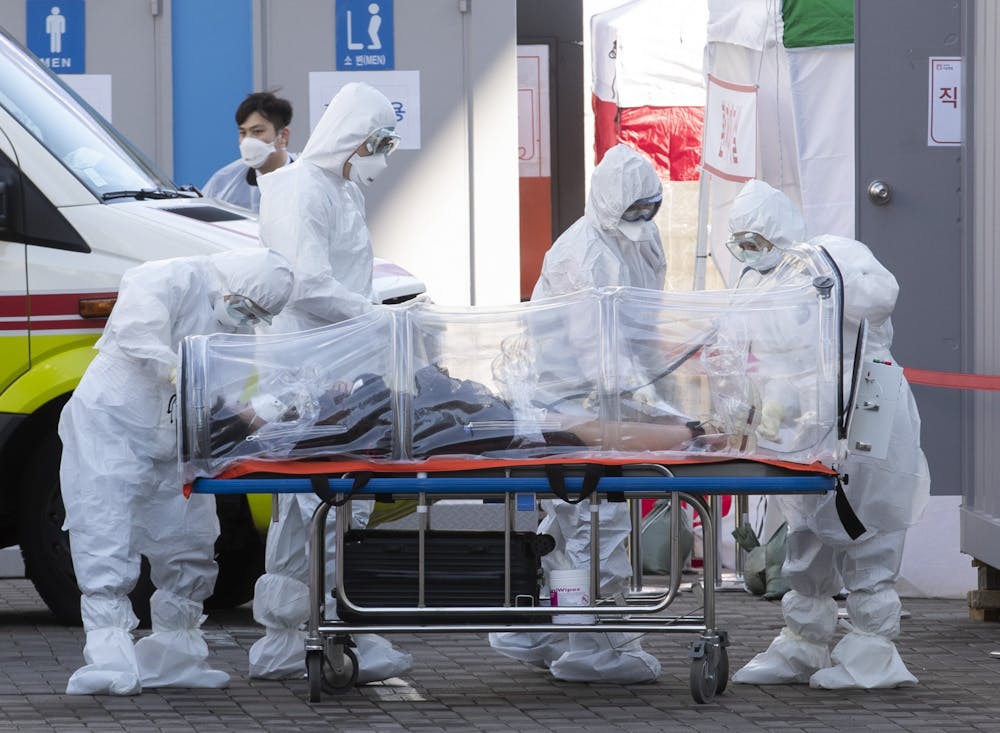The World Health Organization declared the coronavirus outbreak a global pandemic Wednesday, one day after the number of confirmed cases in the U.S. surpassed 1,000. In Indiana there are now 11 confirmed cases, including three in Johnson County, just two counties away from Monroe County. IU implemented a series of measures Tuesday designed to protect students, faculty and staff from the disease.
The measures include banning university-affiliated international travel and domestic travel outside Indiana, restrictions on events involving more than 100 people and canceling in-person teaching through April 5.
These steps seem drastic. But IU made the right decision.
Previous steps taken by the university would not have been enough to curtail the virus. An IU public safety advisory March 4 advocated for voluntary self-quarantines as the main defense against a potential COVID-19 outbreak on campus.
But encouraging students to self-quarantine — without also adjusting campus policies — was not a sufficient response. Students face incentives that would encourage them to break quarantines, such as classes that require attendance.
A March 10 email from President Michael McRobbie addressed these concerns. Moving all classes to an online platform removes the incentives that encourage sick students to attend class.
IU is in good company with this decision. Universities such as Harvard University, Ohio State and the University of Washington have already taken similar measures.
The health advisory also discusses limiting faculty and staff obligations over the next weeks, encouraging managers to determine if work can be completed remotely.
Some may argue that this does not go far enough, and an entire shutdown of campus is necessary. But this extreme response would be problematic for several categories of students.
Some students’ homes may be in cities or states with more COVID-19 cases than the 11 that have confirmed as of Wednesday in Indiana. Other students may be from countries such as China or Italy, where going home could be riskier than staying in Bloomington.
This is a particularly concerning reality for students living in on-campus housing. Shutting down the entire campus would put these students in an untenable situation. The more measured response from IU accommodates students for whom traveling home doesn’t make sense.
The university’s recommendations are not perfect. One major problem is encouraging students to travel home.
IU is advising students to return to their permanent residences, which raises questions about how students who live on campus and cannot easily go home could complete a 14-day self-quarantine.
Temporarily returning home could also be dangerous. In issuing a blanket statement that students should travel home, the university implicitly condones traveling to or through potential COVID-19 outbreaks. A more nuanced statement about how students should travel home safely would have been better.
But given that campus will remain open for students, this messaging failure is mitigated by the university’s actions.
The time frame indicated also works to the university’s advantage. The two-week period following spring break is short enough that, if COVID-19 becomes contained, the rest of the semester can continue with minimal disruption.
And the two-week period is exactly the quarantine period — so anyone crazy enough to take advantage of cheap flights to Italy can come back from spring break and take classes remotely with a lower risk of infecting fellow students. Some students might travel to Europe and remain there after spring break. IU should ensure that students who return from high-risk countries complete the full quaruntine period.
It's unclear how spring trips to Europe will change following President Donald Trump's announcement Wednesday that the U.S. will suspend all travel from Europe starting Friday night. The president said Americans can return to the U.S. if they undergo appropriate screenings.
But if the coronavirus continues to spread unabated through the state, the two-week period provides flexibility for further measures.
A failure to contain COVID-19 may mean students returning to campus April 6 risk bringing the coronavirus with them to Bloomington. But the statement IU provided and the pivot to remote learning allows for extensions as the situation is brought under control.
For a university that previously argued it wasn’t responsible for student’s health concerns about moldy dorms and that fails to adequately fund mental health services for students, these proactive measures are a breath of fresh air.
McRobbie and IU administrators are faced with a difficult situation, and in the face of these hardships, they made the right call.
Christian Sayers (he/him) is a senior studying mathematics and economics. He hopes to someday own a large rabbit.






